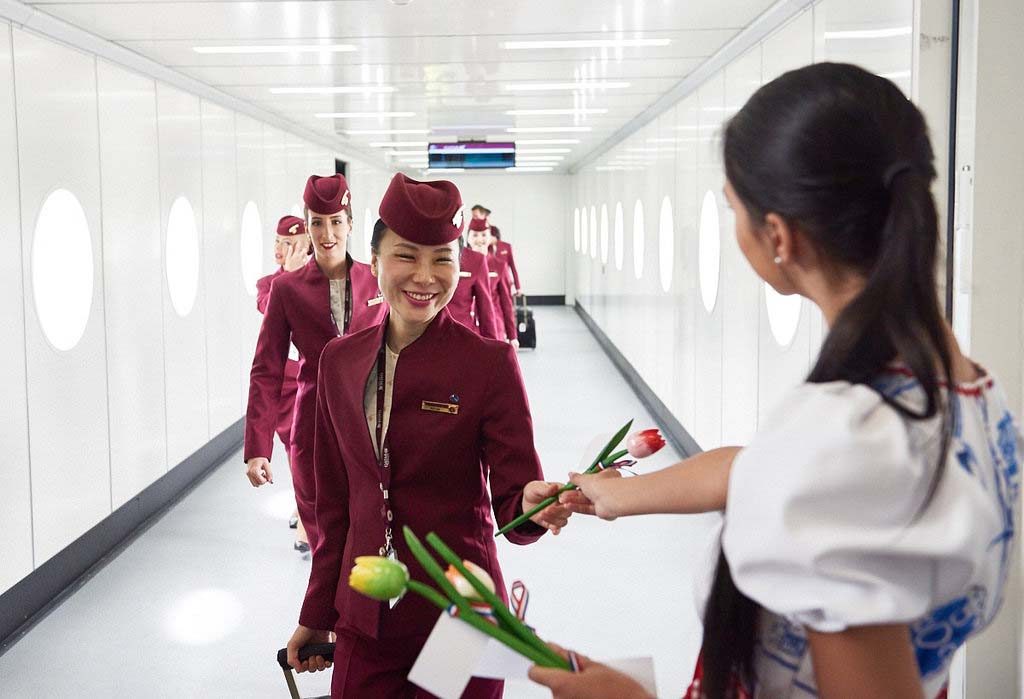
Qatar Airways cabin crew will now be allowed to continue to work for the airline while pregnant, the company has said.
The change of contract terms means that instead of automatically losing their jobs, crew will now be offered temporary roles on the ground.
The move, which comes amid staff retention concerns, follows another amendment to contracts made last December that allow cabin crew to marry in the first five years of service without having to ask permission from the company.
Previously, crew who married without permission were fired.

A spokesperson for Qatar Airways told AFP that the new rules had been “phased in” over the past six months.
It is understood that other restrictions governing the lives of the airline’s cabin crew, like a ban on being driven around by male friends and a night-time curfew remain in place.
Still, the policy switch for pregnant employees represents a significant change of heart at Qatar Airways, whose CEO has previously told reporters that staff “shouldn’t complain” if they understood the terms of the contract that they were signing.
In comments made in March last year, Akbar Al Baker said that the airline believed it needed to get “a good return” on the investment it made while training its cabin crew:
“You know, they have come there to do a job and we make sure that they are doing a job, that they give us a good return on our investment,” he said.
“If you come to seek employment with Qatar Airways we give you a document that these are the rules and regulations, if you as a mature individual accept those conditions, then you shouldn’t complain.”
At the time, Al Baker added that Qatar Airways had only a limited number of ground roles it could offer pregnant crew, who are unable to fly due to health concerns:
“We are not in the business where we can guarantee ground jobs or let people stay away … and don’t do anything for the airline,” he said.
Criticism from the UN
The improvement in working conditions follows a high profile campaign to improve the terms of employment for the airline’s 9,500 cabin crew, the majority of whom are female.

In June this year, the UN’s International Labour Organization (ILO) called on Qatar’s national carrier to scrap several working stipulations for its female employees, including the rules for pregnant cabin crew.
The ILO had published a report that investigated complaints filed by two labor advocacy groups, the International Trade Union Confederation (ITUC) and the International Transport Workers’ Federation (ITWF).
Although it did not support all of the complaints made by the unions, it did endorse calls for the termination of cabin crew contracts during pregnancy to be scrapped.
It also called for the ban on cabin crew accepting rides from male friends to and from their home to be lifted.
Staff retention concerns
Despite intense media scrutiny of its terms and conditions for cabin crew, Qatar Airways insists that the decision to amend employee contracts was made following a “review of working practices” that management initiated last year – and not because of criticism from the ILO.
This assertion is backed up by previous statements made by Akbar Al Baker at the Paris Air Show earlier this year, where he reportedly dismissed the ILO’s findings:
“I don’t give a damn about the ILO – I am there to run a successful airline. This is evidence of a vendetta they have against Qatar Airways and my country,” Reuters quoted Al Baker as saying.

In an interview with Bloomberg, Rossen Dimitrov, senior vice president at the airline in charge of cabin crew, said that the rule changes were being made to help the airline retain its staff.
“As the airline matures, the workforce matures. You can’t turn to someone who is 35 years old and say ‘No, you can’t have a family, wait.’ We want to retain people,” he said.
According to Dimitrov, Qatar Airways needs to recruit at least 6,000 more cabin crew in the next two years, as its forges ahead with its plans for rapid expansion, with new jets being delivered on a regular basis.
The airline has more than 200 new aircraft on order, more than twice the number of jets – 157 – that it currently operates.
The airline’s increased staffing needs mean that as well as continuing with cabin crew recruitment drives around the world, the company also now needs to focus on persuading its current crew to remain with the airline.
Staff meetings
To this end, the company has been holding a series of meetings for its existing cabin crew to explain recent improvements in their contracts, as well as inviting them to raise concerns.
The airline recently invited a journalist from Bloomberg to attend one of the meetings, although it did so on the proviso that the reporter would not report what airline officials said during the session.

The resulting story does however report some of the concerns raised by existing crew, including a ban on using mobile phones while in uniform, and a night-time curfew that requires employees to return to their company-provided housing between 4am and 7am every night, unless on duty.
It is understood that the airline has also held similar meetings for its pilots, resulting in some improvements in contractual terms and conditions for the airline’s flight crew.
Qatar Airways is not the only airline in the region dealing with grievances from unhappy staff. Cabin crew from Dubai-based Emirates have also recently been attending meetings with management to talk about issues stemming from the airline’s rapid expansion.
Emirates cabin crew have told the Wall Street Journal that they are now working more shifts with shorter layover times, and that some crew have had their leave entitlement postponed to cover staff shortages.
No unions
Such meetings with management are unusual in the Gulf, where foreign workers are prohibited from organizing into unions.
In the past, Al Baker has said that this ban has helped his airline and other Gulf companies to be more successful and competitive.
However, the prohibition is not looked upon favorably by many of the airline’s overseas competitors.
Two years ago, Qatar tried to convince the UN civil aviation body ICAO to shift its headquarters from Montreal to Doha, but quickly withdrew the bid over international furor about the idea.
At the time, Al Baker hit back at the International Transport Workers’ Federation (ITF) ‘s suggestion that it should not host ICAO because it prohibits trade unions:
“If you did not have unions you wouldn’t have this jobless problem in the western world… It is caused by unions making companies and institutions uncompetitive and bringing them to a position of not being efficient.
If you go and ask the politicians in most of the countries in the western world they would love to have the system we have: where the workers have rights through the law but they do not have rights through striking and undermining successful institutions that provide jobs to their knees.”
Qatar Airways has not yet responded to questions from Doha News about its new policies.
Thoughts?







